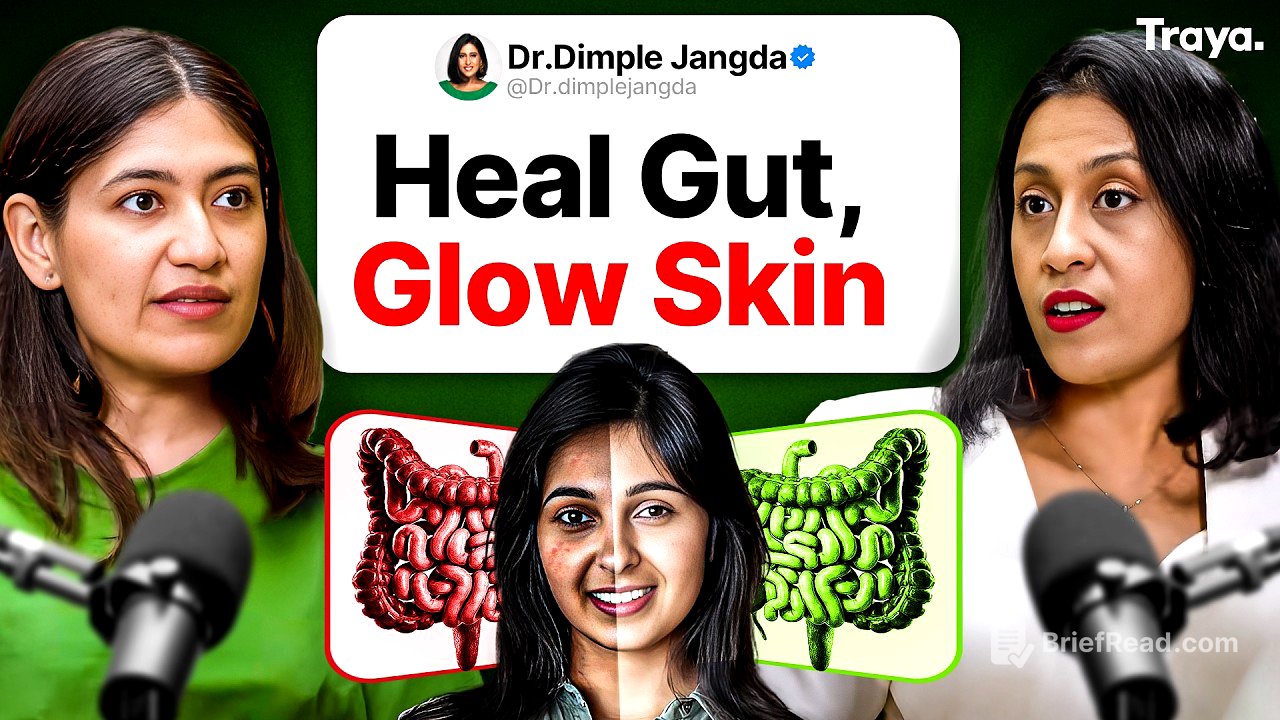TLDR;
This YouTube video features Dr. Dimple Jangra, an Ayurvedic practitioner and bestselling author, discussing the importance of gut health and food chemistry for overall well-being. She shares her personal journey from investment banking to holistic health, emphasizing preventive healthcare and the power of food as medicine. The discussion covers various topics, including the impact of genetically modified foods, the prevalence of diseases like thyroid issues and PCOS, and practical tips for women's health, fertility, and managing stress. Dr. Jangra advocates for plant-based diets, mindful eating, and spiritual practices to achieve a balanced and healthy life.
- Gut health is crucial for overall well-being and can be improved through food chemistry.
- Modern food processing and genetically modified ingredients contribute to various health issues.
- Plant-based diets, mindful eating, and stress management are key to preventive healthcare.
Intro [0:00]
The video introduces Dr. Dimple Jangra, an Ayurvedic practitioner, highlighting her work in combining ancient Ayurvedic science with modern research and nutrition. She emphasizes that food can either nourish or poison the body, pointing out issues with genetically modified wheat and corn, as well as dairy products filled with hormones from unhealthy cows. Dr. Jangra is determined to help people improve their gut health, brain function, and overall well-being through better food choices and lifestyle adjustments.
From a challenging childhood to becoming a best-selling author. [4:10]
Dr. Jangra shares her personal health struggles from childhood, including epilepsy, migraines, and a cancer scare. She recounts multiple surgeries and a traumatic experience of waking up during one of them. These experiences led her to question conventional medical treatments and seek alternative healing methods, ultimately guiding her journey into Ayurveda and food chemistry.
I have everything but wasn’t happy [7:50]
At the peak of her career as an investment banker, Dr. Jangra felt unfulfilled despite having material wealth and success. She divorced from an abusive marriage and decided to explore her purpose in life. This led her to travel extensively and eventually realize that her past health issues had a deeper meaning, prompting her to study Ayurveda and start a clinic.
My body started healing [9:40]
While spending time in the countryside, Dr. Jangra's health began to improve significantly. She experienced restful sleep for the first time in years and regained her appetite. This transformative experience led her to discover Ayurveda and invest her savings in starting a clinic, marking a shift from a career focused on financial gain to one centered on healing and wellness.
Patients and doctors have a huge gap [11:15]
Dr. Jangra discusses the gap between modern medicine and Ayurveda, noting that patients often lack a clear understanding of their treatments. To bridge this gap, she spent time explaining medical advice to patients, researching extensively to answer their questions. This process helped her find her own answers and realize her purpose in serving society through health and wellness.
How can food chemistry make you healthy [13:26]
Dr. Jangra explains that food chemistry, particularly the concept of "viruddha ahar" (wrong food combinations), is a small but significant part of Ayurvedic knowledge. She emphasizes that food can either nourish or poison the body, with internal factors like food combinations, nutrition, and lifestyle choices playing a crucial role in health. She advocates for preventing diseases by correcting these internal factors, rather than solely relying on external cures.
Our children are born sick because of the mistakes we’re making [16:35]
Dr. Jangra points out that diseases once common in older adults are now affecting children, highlighting the impact of modern diets and environmental factors. She discusses the dangers of plastic in food and the increasing evidence of microplastics in the human body, which can disrupt endocrine glands and cause cancer. She stresses the importance of addressing the root causes of health issues rather than just treating the symptoms.
Thyroid, PCOS, PCOD [18:02]
Dr. Jangra discusses the rising prevalence of thyroid issues and PCOS among women, noting that many are put on birth control pills, which can have harmful side effects. She criticizes the genetic modification of foods like wheat and corn, as well as the hormone content in dairy products from factory-farmed cows. She asserts that understanding the connection between food and health is crucial for resolving many health issues.
Our diary products make us unhealthy [19:44]
Dr. Jangra elaborates on the harmful effects of dairy products, particularly those from unhealthy cows raised in factories. She explains that these products are often filled with blood, estrogen, and hormones, which can negatively impact human health. She notes that gynecologists often advise patients with PCOS or thyroid issues to avoid dairy, wheat, white rice, meat, seafood, and eggs, highlighting the role of food in causing disease.
Reality of packaged food [22:15]
Dr. Jangra criticizes packaged and processed foods, noting that their preservatives allow them to survive on shelves for months and can have similar effects in the gut. She explains that these foods are genetically modified to withstand long-distance transportation, benefiting corporations but harming consumers' health. She emphasizes the importance of being aware of the ingredients in packaged foods and choosing fresh, whole foods instead.
How does gluten make us unhealthy? [23:25]
Dr. Jangra explains that modern wheat has been genetically modified to have a thicker gluten content, making it difficult to digest. This undigested gluten accumulates in the body, leading to weight gain and other health issues. She notes that this undigested protein can trigger cancer cells in the colon, increasing the risk of colorectal cancer at younger ages.
tips for women to remain healthy [26:35]
Dr. Jangra emphasizes the importance of educating and empowering women to improve their health, as they often transfer this knowledge to their families. She stresses that healing a child with PCOS or PCOD requires the involvement of both parents, not just the child or mother. She advises against keeping alcohol in the house and taking children to fast-food restaurants, which serve unhealthy, modified foods.
Stop this if you want your child to be healthy [28:18]
Dr. Jangra advises parents to stop bringing alcohol into the house and avoid taking children to fast-food restaurants. She recommends visiting farmers' markets and involving children in the process of buying fresh fruits and vegetables. She suggests a diet consisting of 50% fresh fruits and vegetables, 30% grains, legumes, lentils, nuts, and seeds, and 20% spices, herbs, and fluids, emphasizing a 95% plant-based approach.
What should we eat as alternatives [34:50]
Dr. Jangra provides alternatives to wheat and white rice, recommending millets like barnyard millet, kodo millet, and foxtail millet, as well as red rice, black rice, and brown rice. She suggests coconut milk as a replacement for dairy, highlighting its sweetness and compatibility with fruits like mangoes. She also discusses the benefits of plant-based milks like almond and cashew milk, while cautioning against excessive consumption of oats and soy.
Perfect recipe for sugar craving [36:55]
Dr. Jangra shares a recipe for a healthy dessert using coconut milk, mangoes, chia seeds, and nuts, emphasizing that it satisfies sweet cravings without the harmful effects of refined sugar. She explains that coconut milk is sweet and helps in repairing and rejuvenating damaged tissues, muscles, and nerves. She also notes that plant-based alternatives can provide sufficient nutrients, including protein, vitamin D, and omega-3.
Hormonal health [42:45]
Dr. Jangra discusses hormonal health, emphasizing the elimination of hormonal foods like animal-based products and certain plant-based foods like cabbage, cauliflower, and soy. She recommends seed cycling to help regulate hormones, using pumpkin and flax seeds for the first 15 days of the cycle and sunflower and sesame seeds for the remainder. She also suggests juicing vegetables like ash gourd, carrot, beetroot, and amla to cleanse the body and balance hormones.
Side effects of the uterus removed [47:50]
Dr. Jangra cautions against unnecessary hysterectomies, noting that removing the uterus can lead to side effects like pre-induced menopause, loss of bone density, and mood swings. She emphasizes the importance of allowing the uterus to heal itself through proper nutrition and avoiding harmful practices. She recommends consuming lots of leafy greens, fresh fruits, and boiled vegetables to support uterine health.
Can fasting help with healing from thyroid issues [50:32]
Dr. Jangra discusses thyroid health, sharing her mother's experience of reversing thyroid issues through alternate-day fasting. She emphasizes the importance of aligning eating cycles with the circadian rhythm, eating within an eight-hour window between sunrise and sunset. She recommends eliminating foods that trigger thyroid issues, such as animal-based foods, wheat, and soy, and adding supportive foods like millets, red rice, and coconut milk.
How gut issues related to hair and skin [58:48]
Dr. Jangra explains the connection between gut health, hair, and skin, noting that the gut is the fuel engine of the body and controls mental and emotional health. She discusses leaky gut syndrome, where undigested food and toxins leak into the bloodstream, causing autoimmune responses. She notes that the body prioritizes nutrition for vital organs, leaving skin and hair as the last to receive nutrients, leading to hair loss and skin issues. She also explains face mapping in Chinese medicine, where different areas of the face correspond to different organs in the body.
How can food improve infertility [1:04:38]
Dr. Jangra discusses the role of food in improving fertility, recommending herbs like ashwagandha and shatavari. She advises cutting out high-estrogen foods and packaged processed foods that interfere with hormonal glands. She also cautions against the overuse of tampons, sanitary napkins, and birth control pills, which can disrupt the natural hormonal balance. She recommends Panchakarma treatments to cleanse the body of toxins and improve fertility.
Panchkarma therapy [1:10:55]
Dr. Jangra recommends Panchakarma treatments, a detoxification therapy, at least once a year after the age of 30 to cleanse the body of toxins. She notes that the air, water, and soil are contaminated, making it essential to eliminate toxins introduced into the body. She shares success stories of patients who conceived naturally after undergoing Panchakarma treatments.
Stress leads to infertility [1:13:12]
Dr. Jangra emphasizes that stress contributes significantly to infertility. She notes that women often face pressure in their careers, leading to increased testosterone and cortisol levels, which impact fertility. She advises taking the stress out of the relationship and the desire to produce a child, emphasizing that it is not the end of the world if one does not have children.
Negative thoughts cause gut health issues [1:19:22]
Dr. Jangra discusses the importance of attitude and thoughts in healing the body, noting that negative thoughts can impact gut health. She advises against overthinking and overanalyzing, as the GI tract is sensitive to emotions. She recommends mindful eating, putting away devices, and building a relationship with food. She also emphasizes the importance of spiritual practices like meditation, chanting, and gratitude to align chakras and sharpen faculties.
Q&A [1:25:23]
In the Q&A segment, Dr. Jangra addresses questions about bloating from apples, improving immunity in children, remedies for sleep issues, coffee consumption during intermittent fasting, constipation, and reducing body heat during menopause. She provides specific dietary and lifestyle recommendations for each issue, emphasizing the importance of listening to the body and making informed choices.









